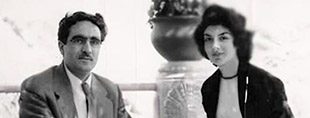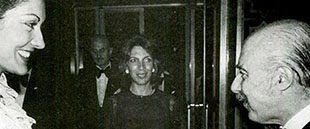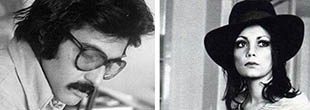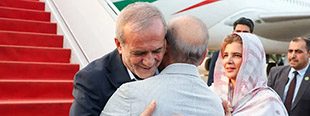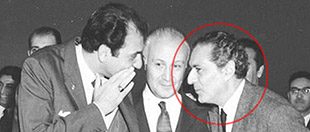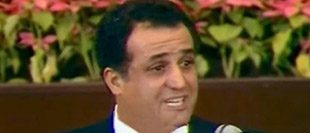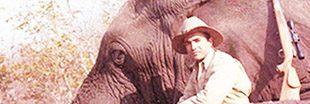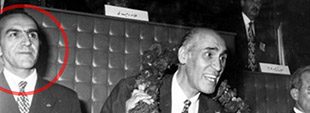In the mid-1930s, Iran stood at a crossroads between tradition and modernity. The reign of Reza Shah Pahlavi (1925–1941) marked a decisive period in which sweeping reforms reshaped every dimension of society—politics, economy, infrastructure, education, and culture. Among these transformations was a project that, while less known than industrial or military reforms, had profound significance for the nation’s cultural identity: …
Read More »spiel
Mahmoud Farshchian, painter and illustrator in a picture frame
Mahmoud Farshchian (February 22, 1929 – August 18, 1404) was one of the most celebrated Iranian painters and illustrators of the 20th and early 21st centuries. Renowned for his distinctive fusion of Persian miniature traditions with modern artistic techniques, he created a school of art that was both deeply rooted in the classical heritage of Iran and open to innovation. …
Read More »Hojabr Yazdani was a economic activist before the revolution
Hojabr Yazdani: From Cattle Rancher to Economic Tycoon of the Pahlavi Era Hojabr Yazdani (June 13, 1934 – April 19, 2010) was one of Iran’s most remarkable and controversial economic figures before the 1979 revolution. His story reflects the rapid economic transformations and political complexities of the Second Pahlavi era, where opportunity, connections, and ambition could propel a man from …
Read More »Sports figures at Dariush Mostafavi’s funeral
Seyyed Dariush Mostafavi (September 17, 1944 – August 10, 1404 / August 1, 2025) was one of the most notable figures in the history of Iranian football. From his early days as a gifted defender on the pitch to his influential—yet controversial—stint as a football administrator, Mostafavi’s life spanned the many transformations of Iran’s sporting and political landscapes. He remains …
Read More »The story of Morteza Avini’s friendship with Ghazaleh Alizadeh
The Unfinished Story of Kamran and Ghazaleh: Love, Ideology, and the Dual Identity of Morteza Avini In the intricate and ever-polarized landscape of Iranian intellectual history, few relationships have evoked as much speculation and silence as the early love between Kamran Avini (later known as Martyr Seyyed Morteza Avini) and Ghazaleh Alizadeh. The contrast between the bohemian, artistic youth of …
Read More »Text and sidebar of the first day of the doctors’ trip to Pakistan
ISLAMABAD, August 11, 1404 (Solar Hijri Calendar) — In a move underscoring deepening regional cooperation and renewed diplomatic vigor, Iranian President Masoud Pezhakian arrived in Pakistan on Saturday evening for a two-day official visit at the invitation of Pakistani Prime Minister Shahbaz Sharif. This visit marks a pivotal chapter in the longstanding bilateral relations between the two neighboring countries and …
Read More »Ahmad Mirfanderski, the last foreign minister of Pahlavi
Mir Sultan Ahmad Mirfundarski was born on Mehr 1, 1297, in a “family of the Ministry of Foreign Affairs” on Amiriyeh Street in Tehran and in Liwa-ol-Molk Alley, which was later renamed Ansari Alley. His father, Abdolrahim, was an official in the Ministry of Foreign Affairs. He had not yet received his primary education in Iran when his grandfather, Ali …
Read More »Mahmoud Jafarian, Deputy CEO of the National Radio and Television Organization
Mahmoud Jafarian: A Life in Power and a Tragic Fall in Revolutionary Iran Mahmoud Jafarian, born in 1928 in Tehran, Iran, emerged as one of the prominent figures during the late Pahlavi era. His political and administrative career intertwined with the most sensitive state institutions of his time, including the National Iranian Radio and Television Organization and the Rastakhiz Party, …
Read More »The Hunter Prince; Abdolreza Pahlavi
Abdolreza Pahlavi (October 22, 1924 – May 12, 2004), the seventh child and fourth son of Reza Shah, lived a life that mirrored the dramatic changes in Iran’s 20th-century history. Born into royalty but often relegated to the sidelines of political life, his story is one of quiet observation rather than direct governance—a prince whose life intersected with monarchy, modernization, …
Read More »Hulako Rambod, Leader of the People’s Party Parliamentary Faction
Hulako Rambod was born into a distinguished lineage on November 18, 1298 (Persian calendar; corresponding to November 18, 1919 Gregorian) in the city of Tehran. His ancestry was deeply embedded in the political and tribal structure of Iran’s Qajar era. He was the youngest son of Mohammad Hossein Khan Karganroudi, widely known by his honorific Salar Asad. Salar Asad was the progeny of Nasratollah Khan …
Read More »
